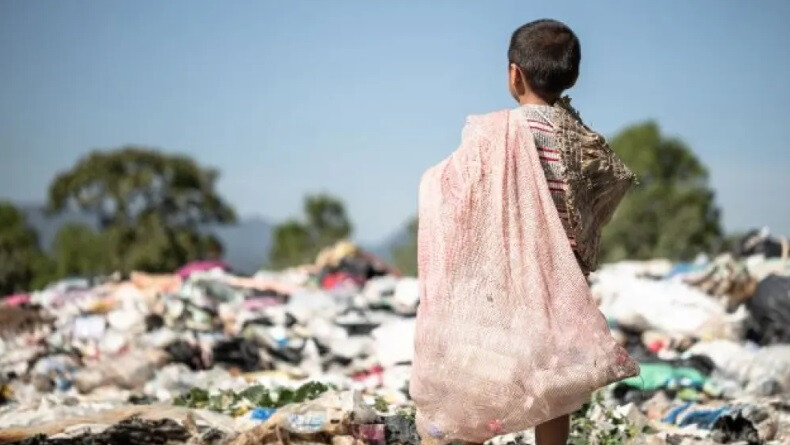
Argentina's child poverty rate has reached its highest level since the 2001-2002 economic crisis, with a shocking 67.3% in the first half of 2024. This alarming figure, released on June 15 by the Social Debt Observatory (ODSA) of the Pontifical Catholic University of Argentina (UCA), clearly demonstrates the severe extent of poverty nationwide. Criticism is mounting as children and adolescents, who represent Argentina's future, remain trapped in a cycle of poverty.
Record Child Poverty Rate and Regional Disparities
The ODSA report, based on data from Argentina's National Institute of Statistics and Census (INDEC)'s Permanent Household Survey (EPH), is the result of research focusing on the rights of Argentine children from 2010 to 2024. The report warns that Argentina's child poverty rate has surpassed 50%, with a staggering 67.3% of children and adolescents living below the poverty line in the first half of 2024. This is more than just a statistical figure; it reflects deep-seated structural issues within Argentine society.
While the child poverty rate did slightly decrease to 52.8% in the second half of 2024, this represents only a partial improvement and highlights significant regional disparities. For instance, the child poverty rate in Buenos Aires City was only 27.1%, whereas Concordia in Entre Ríos Province recorded the highest rate nationwide at 75%. This stark contrast reveals the severe economic imbalance within Argentina. Even more concerning is that the child poverty rate remains over 20 percentage points higher than the adult poverty rate (32.8%), indicating that the cycle of poverty disproportionately affects the younger generation.
Catastrophic Impact of Macroeconomic Crisis and Inflation
The report attributes the worsening poverty in the first half of 2024 to a severe macroeconomic crisis. It states, "This deterioration occurred amid a severe macroeconomic crisis characterized by accelerating inflation and a decline in the purchasing power of labor income." Indeed, cumulative inflation reached 62.4% during this period, resulting in the income of impoverished households being 42.6% below the cost of the Basic Food Basket (Canasta Básica Total).
Inflation has been a chronic problem in Argentina for years, notably reaching an astonishing 211.4% annually in 2023, devastating the lives of its citizens. While it stabilized somewhat to 117.8% in 2024, it remains at a crippling level. According to an INDEC report, cumulative inflation in Argentina rose by 13.3% in the first five months of 2024. This persistent rise in prices has had a devastating impact on low-income households, especially those raising children. With wage increases failing to keep pace with rising costs, real incomes have continued to decline, leading directly to the surge in child poverty.
Partial Recovery and Government Social Support Policies
Fortunately, the second half of 2024 saw a partial recovery thanks to three factors: dollar stabilization, declining inflation, and increased social transfer spending. The report explains, "While still at a high level, this partial recovery can be explained by the exchange rate and inflation stabilization in the second half of the year, and the process of increasing the real value of AUH (Universal Child Allowance) which began in early 2024."
The AUH (Asignación Universal por Hijo) is a universal allowance paid by the Argentine government to children from low-income families, which saw increases of 100% in January 2024, 27% in March, and 41% in June. Additionally, the Tarjeta Alimentar policy was expanded. Tarjeta Alimentar is a national support program that assists pregnant women and families raising children with food purchases to improve their nutrition. These strengthened government social support measures helped improve the purchasing power of basic food baskets for impoverished households. However, the report cautions, "While these strengthening measures improved the coverage of the basic food basket, they did not reverse the impact of the crisis on households with children." This indicates that despite government efforts, a complete resolution to the poverty issue remains challenging without addressing the underlying causes of the economic crisis.
Root Causes of Child Poverty in Argentina and Future Outlook
The fundamental causes of child poverty in Argentina lie in chronic macroeconomic instability, high inflation, and insufficient employment opportunities. Long-standing economic crises and policy instability have led to reduced investment and lower productivity, hindering sustainable economic growth. Furthermore, Argentina is one of the countries with the highest inflation rates globally, which severely erodes the purchasing power of low-income individuals and exacerbates the vicious cycle of poverty. The large informal sector and a lack of quality jobs also contribute to worsening child poverty. When parents struggle to secure stable incomes, it becomes difficult for them to provide essential resources and opportunities for their children.
Argentina's economy is highly sensitive to political changes, tending to fluctuate rapidly based on government policy directions. The current government under President Javier Milei is pursuing radical austerity measures and free-market reforms. While it remains uncertain whether these policies will bring long-term stability to the Argentine economy, they are creating significant short-term burdens for the working class. Concerns are particularly raised that cuts to subsidies and reductions in public spending could directly impact low-income groups, further worsening poverty rates.
Child poverty is more than just an economic issue; it is a serious problem that threatens the entire future of society. Children growing up in impoverished environments are less likely to enjoy basic rights such as education, health, and nutrition, which can hinder human capital development in the long run and perpetuate social inequality. For Argentina to overcome the challenge of child poverty, fundamental structural reforms are urgently needed, moving beyond short-term social assistance to achieve sustainable economic growth and address income inequality. Otherwise, Argentina's future may face a bleak reality where more children remain trapped in the cycle of poverty.
[Copyright (c) Global Economic Times. All Rights Reserved.]






























